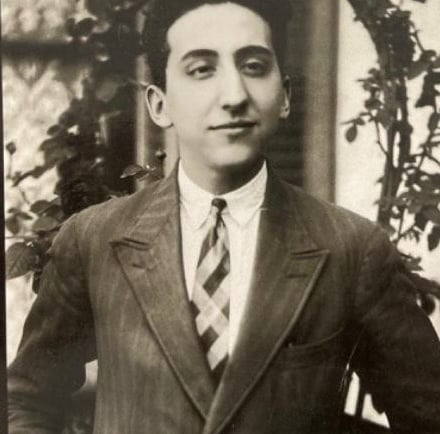Juan Matas Salas
Juan Matas Salas, a Spanish political refugee following the military coup in Spain, led a life marked by exile and resilience. Fleeing the Franco regime, his journey took him across Europe, including imprisonment in Rome and on the island of Ventotene—where the concept of the European Union was born among fellow prisoners. Matas Salas documented these harrowing yet enlightening experiences in his work *Mi Odisea* (My Odyssey). His writing provides a poignant narrative of survival, offering profound reflections on displacement, identity, and the formative moments in European history, making a significant contribution to travel literature with its unique historical perspective.
Borja Vázquez Fontao
4 min read


Juan Matas Salas: A Political Refugee’s Odyssey Through Europe’s Tumultuous History
Juan Matas Salas, a Spanish intellectual and political activist, became an unexpected traveler through the harsh landscapes of war-torn Europe following the Spanish Civil War. His life, shaped by exile and adversity, led him on a journey that traversed not just physical borders but the profound depths of human resilience and the search for identity. In his deeply moving memoir, Mi Odisea (My Odyssey), Matas Salas recounts the harrowing experiences of his forced travels, including his imprisonment in Rome and on the island of Ventotene—where the seeds of the European Union were sown. Through these accounts, he offers a unique perspective on the personal and political struggles that defined mid-20th-century Europe.
The Journey Begins: Fleeing Franco’s Spain
The military coup of 1936 in Spain marked the beginning of a long and arduous journey for Matas Salas. As a fervent opponent of Francisco Franco’s fascist regime, he was forced to flee his homeland, leaving behind a life and ideals that had suddenly become dangerous. His escape led him across the Pyrenees into France, and eventually to Italy, where he hoped to find refuge. However, the Europe he encountered was in the grips of its own turmoil, with fascism spreading across the continent.
In Mi Odisea, Matas Salas reflects on the emotions that accompanied this initial flight—fear, uncertainty, and a profound sense of loss. Yet, alongside these darker feelings, there was also a sense of adventure and the stubborn hope that exile could bring new opportunities for resistance and solidarity. He writes, “The road to freedom was long and treacherous, but each step forward, though fraught with danger, was a step away from oppression” (Matas Salas, Mi Odisea, p. 12).
Imprisonment in Rome and Ventotene: Where Freedom and Europe Were Dreamed
Matas Salas’s journey took an unexpected turn when he was arrested in Rome by Mussolini’s forces. This imprisonment would lead him to Ventotene, a small island in the Tyrrhenian Sea, which at that time served as a prison for political dissidents. Ventotene was not just a place of confinement; it was a crucible of ideas. Among the prisoners were intellectuals like Altiero Spinelli, who would later draft the Ventotene Manifesto, a visionary document that laid the groundwork for what would become the European Union.
In Mi Odisea, Matas Salas describes the strange mix of despair and hope that defined his time on Ventotene. On the one hand, the prisoners endured harsh conditions, isolation, and the constant fear of execution. On the other, there was an intense intellectual camaraderie that blossomed among the inmates. Matas Salas humorously recounts how debates over political theory would often be interrupted by the more practical concern of rationing their meager food supplies. “One moment we were discussing the future of Europe, the next we were arguing over who had stolen the last piece of bread” (Matas Salas, Mi Odisea, p. 45).
His time in Ventotene also instilled in him a deep sense of European unity. The conversations he had there planted the idea that Europe could rebuild itself, not through domination, but through cooperation and shared values. This vision, born in the most unlikely of places, became a central theme in his later writings, where he reflected on the importance of solidarity across national boundaries.
Emotional Landscape: The Pain of Exile and the Search for Purpose
Throughout his memoir, Matas Salas delves into the emotional toll of being a perpetual outsider. Exile, he notes, is more than just physical displacement; it is a state of mind. The loss of one’s homeland creates a void that is difficult to fill, and the constant movement from place to place leaves one in a state of perpetual uncertainty. “Exile,” he writes, “is the death of what was and the birth of what could be, yet neither life is fully lived” (Matas Salas, Mi Odisea, p. 78).
Despite this, Matas Salas found purpose in his plight. His experiences solidified his commitment to fighting fascism and advocating for a Europe that could rise from the ashes of war. His motivation was not just personal survival, but the hope that his journey—and the journeys of others like him—could contribute to a better future.
Challenges and Experiences: The Struggle for Survival
Survival in a Europe at war was no easy feat. Matas Salas faced numerous challenges, from evading fascist forces to navigating the treacherous terrain of political alliances. In Mi Odisea, he recounts a particularly tense episode when he was forced to pose as an Italian fisherman to escape detection by Mussolini’s police. His disguise was almost perfect, except for one small detail: he couldn’t speak Italian. The situation reached a comic climax when, after being questioned by a suspicious officer, Matas Salas could only respond with a string of fishing-related words he had hastily memorized. “Pesce, pesce,” he blurted out, to which the officer, puzzled but uninterested, eventually let him go (Matas Salas, Mi Odisea, p. 53).
These challenges, though often life-threatening, were met with a mixture of ingenuity and determination. Matas Salas’s writing is filled with such anecdotes, where humor and resourcefulness become tools of survival. His ability to find light even in the darkest moments adds a unique dimension to his memoir, making it not just a story of hardship, but also one of resilience and hope.
Legacy in Travel Literature: A Testimony of Exile and Hope
Juan Matas Salas’s Mi Odisea is more than just a travel memoir; it is a testament to the power of the human spirit in the face of adversity. His detailed accounts of the places he visited, from the prisons of Rome to the intellectual circles of Ventotene, offer readers a unique insight into the experiences of a political refugee during one of Europe’s most turbulent periods.
Matas Salas’s contribution to travel literature lies in his ability to weave personal narrative with broader historical events. His writing not only documents the physical journey of exile but also explores the emotional and intellectual landscapes that defined his experiences. By sharing his story, Matas Salas provides a valuable perspective on the struggles and hopes of those who, like him, were forced to navigate a world in turmoil.
Conclusion
Juan Matas Salas’s journey through Europe, as captured in Mi Odisea, is a powerful reminder of the resilience required to survive in a world turned upside down by war and dictatorship. His memoir offers a poignant and often humorous look at the challenges of exile, the search for identity, and the enduring hope for a better future. Through his writing, Matas Salas not only contributes to the rich tradition of travel literature but also leaves a lasting legacy as a voice for those who dared to dream of a united, peaceful Europe even in the darkest of times.
